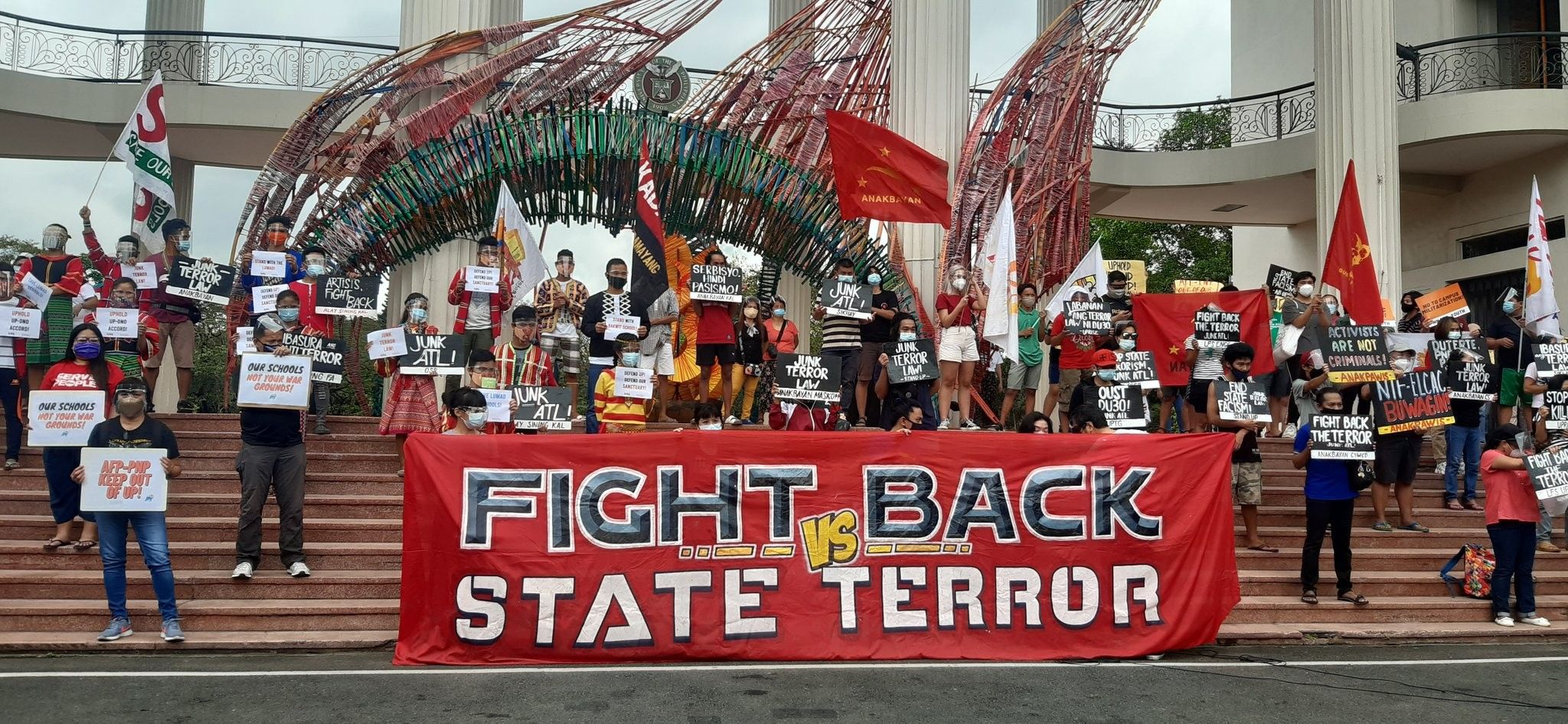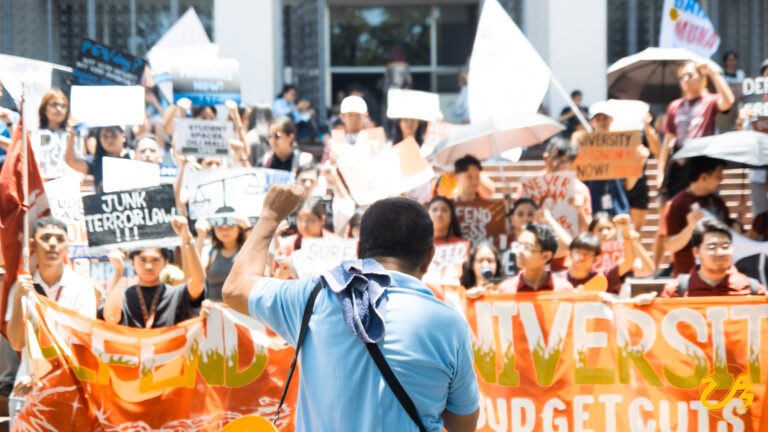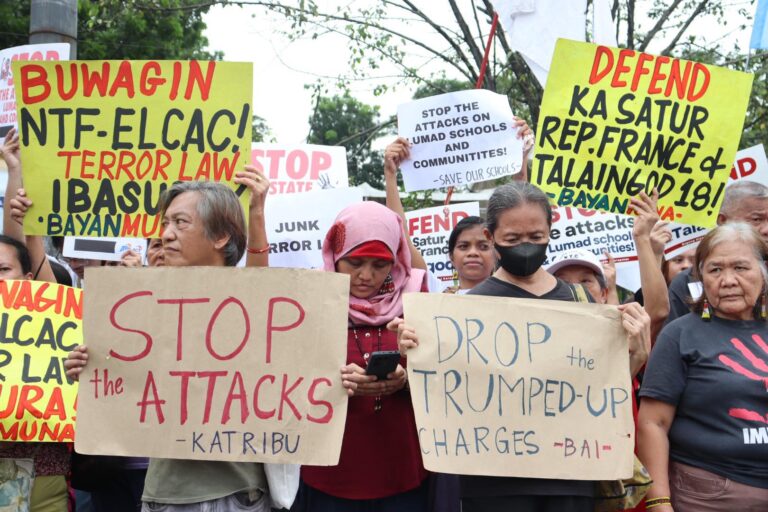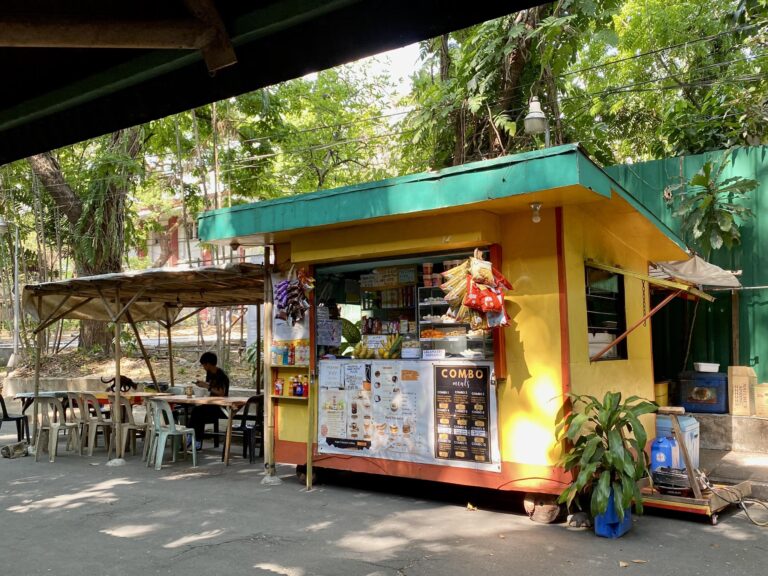
The House Committee on Higher, Technical and Vocational Education (CHTVE) discussed Senate Bills 2002, 2014, 2035 and House Bill (HB) 10171, seeking to institutionalize the UP-DND Accord during the Joint Public Hearing in the Senate on December 7, Tuesday.
As a substitute for the accord that was unilaterally terminated by Defense Secretary Lorenzana last January, HB 10171 was crafted to strengthen the protection of UP campuses from possible police and military intervention, harassment, and intimidation.
Atty. Norman Daanoy, the chief of the DND Legal Affairs Service, justified how they have no reason to continue with their obligation to the UP-DND Accord as the PNP is no longer under DND.
He continues to say that the abrogation of the UP-DND Accord is “not about academic freedom or expression”, and how the UP Security bill limits law enforcement activities inside the campuses.
“There are so many UP students who were killed and captured during military and police encounters joining the CPP-NPA,” Daanoy claims.
As a response, Dean Carlo Vistan from UP College of Law explains the importance of the UP-DND accord by stating that all learning institutions have an obligation to provide a safe learning environment for all students, and this cannot be done without the safeguards written in the accord.
The proposed bills lay out a proper framework and mechanisms between government forces and universities; they do not prevent state forces from going after lawless elements.
“Malinaw sa batas na obligasyon ng lahat ng universities na pangalagaan ang security to protect academic freedom. Kinikilala ng Supreme Court iyan at ang UP Bill na ito ay nagbibigay-laman dito,” he said.
“We need legislation para maging klaro ang pagtutulungan ng UP at state security na maipatupad ang batas. Naniniwala kami na dapat ipatupad ang batas. Pero dapat kilalanin din ang karapatan ng mga universities.” Vistan continues, in response to Daanoy.
“Termination of the UP-DND Accord opens up the possibility of abuse of authority and human rights violations that were the cause for the signing of the Accord in the first place,” Student Regent Renee Co also said.
The Defend UP Network headed a National Day of Action for Academic Freedom in support of the institutionalization of the bill where various sectors clamored their condemnation on the state’s continuous encroachment of academic spaces.
Students stood firm on their stance against the abrogation of the UP-DND accord on campus, emphasizing the importance of the accord by recounting the numerous cases of students that have been threatened and red-tagged by state forces.
“Nasa sari-sarili man tayong mga tahanan, dama natin ang red-tagging. Kailangan nating siguruhin na walang sasalubong na red-tagging at pandarahas sa mga estudyante sa pagbabalik nila sa paaralan,” Kiara Gorrospe from Rise for Education UPD stated.
Students also explained how, in a time when activists and marginalized peoples are being slaughtered by the state, academic institutions should play an active role in protecting their students. This includes challenging the state for removing books that are considered “radical” from public libraries as well as publicly supporting student publications that have been taken down by state trolls.
As CSSP FST Chairperson Nick Aguilar said, “Paano tayo magiging konsensiya ng bayan kung di natin kaya mag-isip? Radikal ang edukasyon, at kailangan natin ng proteksyon mula sa NTF-ELCAC, AFP at PNP.”
However, apart from students, different sectors have joined the fight alongside the youth sector to achieve the institutionalization of HB 10171.
Salvacion Tuborro from Magkaisa Arboretum expressed their organization’s support of the accord due to the incessant harassment they have faced from the police in their community.
“Kami na rin mismo sa arbo ay nakakaranas ng takot dahil halos araw-araw naroroon ang kapulisan. Walang ginagawa ang mga pulis kundi maghasik ng takot sa komunidad ng UP.” she said.
Melo Mar from NNARA Youth shared the same sentiments, stating how the abrogation of the accord will affect marginalized communities such Lumads, farmers and the urban poor who sought sanctuary in the University to further their own calls for justice.
As students start to return to schools in 2022, the institutionalization of UP-DND accord ensures that there are proper safeguards enacted in the university to protect the wellbeing of the UP’s constituents both in physical and online spaces, especially amid constant state repression.
“We continue to believe that legislation to protect academic freedom and the intrusion of police and military in campuses should include not only UP, but all schools and educational institutions.” Co stated.
“Ang kalayaang ito ang nagbibigay sa UP ng pag-iral na makalaya mula sa tanikala na dulot ng kahirapan at inhustisya.” added UPLB VCAA Janette Malata-Silva.
Silva asserts the fight to uphold the UP DND Accord transcends the university’s borders and extends to other sectors.
The UP-DND accord was an agreement established on June 13, 1989 between the University of the Philippines and the Department of National Defense to ensure the academic freedom and safety of the UP’s constituents in the wake of the student victims from the Marcos dictatorship.
The agreement barred any member of the Armed Forces of the Philippines, the Philippine National Police and other law enforcement agencies from entering or conducting any operations on the University’s grounds.
#DefendAcademicFreedom
#LigtasNaBalikEskwela
#DefendUP
Featured photo by Philippine Star








I do agree with all the ideas you have offered in your post. They’re very convincing and will certainly work. Nonetheless, the posts are very brief for starters. May just you please extend them a bit from next time? Thanks for the post.